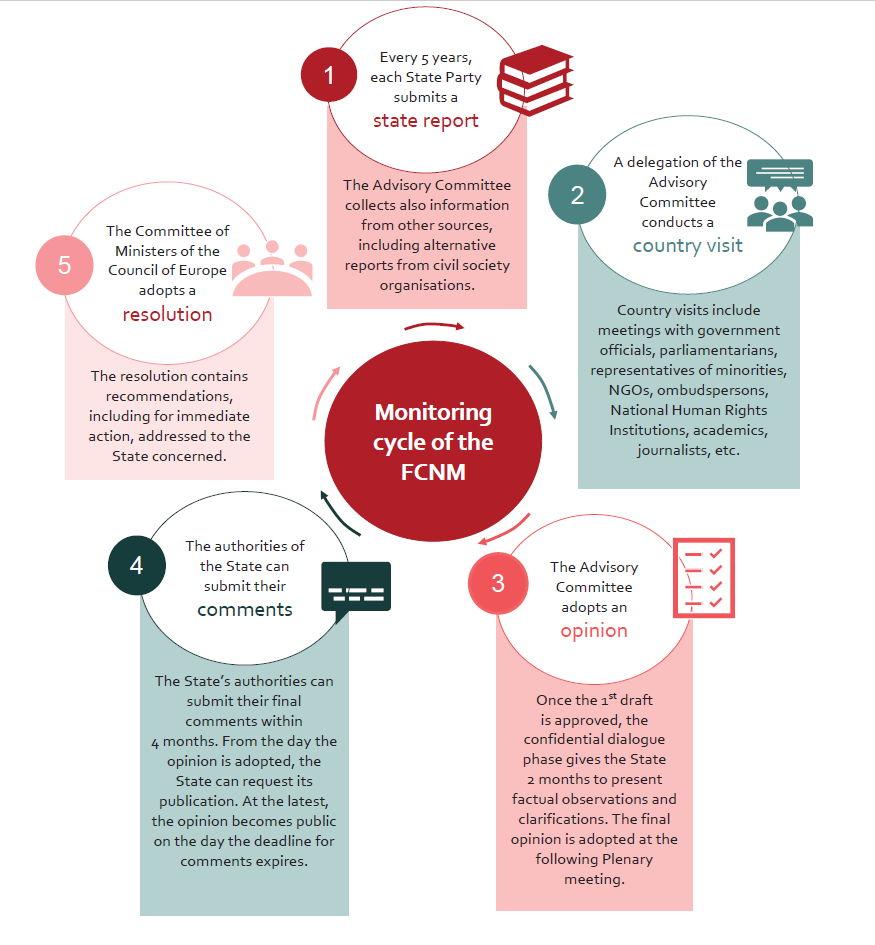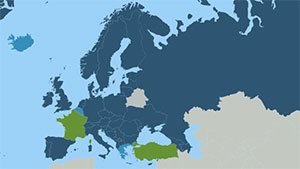About the Framework Convention for the Protection of National Minorities
The Framework Convention for the Protection of National Minorities (Framework Convention) is Europe’s most comprehensive treaty protecting the rights of persons belonging to national minorities.
It is the first legally binding multilateral instrument devoted to the protection of national minorities worldwide, and its implementation is monitored by the only international committee dedicated exclusively to minority rights: the Advisory Committee. It was adopted on 10 November 1994 by the Committee of Ministers and it entered into force on 1 February 1998. It is now in force in 38 states.
Why is it called a “Framework” Convention?
Whilst the Framework Convention is a legally binding instrument under international law, the word “Framework” highlights the scope for member states to translate the Convention’s provisions to their specific country situation through national legislation and appropriate governmental policies.
What is a national minority?
The Framework Convention for the Protection of National Minorities does not contain a definition of "national minority" as there is no general definition agreed upon by all Council of Europe member states. There is therefore a certain flexibility, or a margin of appreciation, given to states to decide who falls under the protection of the Framework Convention. This decision must be made in good faith, in-keeping with general principles of international law, including free self-identification.
The principle of free self-identification is the cornerstone of minority rights. It means that individuals have the right to decide themselves whether they wish to be identified as belonging to a national minority, and which one(s). However, their decision must be based on objective criteria connected with their identity, such as their religion, language, traditions and cultural heritage.
States have varied approaches with regard to the definition of a national minority under the Framework Convention: from a restrictive approach with, for example, a set list of traditional groups that are to benefit from the Framework Convention’s protection; to a more open approach, applying the articles of the convention flexibly to a broad spectrum of groups.
For further information, please refer to Thematic commentary No. 4: The scope of application of the Framework Convention for the Protection of National Minorities, adopted on 27 May 2016.
How many people in European states belong to national minorities?
Obtaining accurate statistics on the size of minority populations in European states is difficult. This is partly because many states do not disaggregate data on ethnic, cultural, religious and linguistic grounds for a variety of historical and political reasons and partly because states do not have reliable or up-to-date census figures. Virtually all European states have some population belonging to national minorities.
What are the States’ obligations?
The Framework Convention sets out rights enjoyed by individuals belonging to national minorities and complementary obligations to be respected by the States:
- Rights enjoyed by individuals belonging to national minorities include:
- Freely expressing ethnic, cultural, linguistic and religious identities
- Not being discriminated against
- Enjoying freedom of assembly, association, expression, thought, conscience and religion
- Using minority languages in contact with the authorities in areas inhabited traditionally or in substantial numbers by national minorities
- Being able to influence public decision making for issues affecting persons belonging to national minorities
- Participating in cultural, social and economic life
Complementary obligations to be respected by the States include:
- Promoting effective equality
- Preserving and developing minority cultures, religions and languages
- Promoting intercultural dialogue and protecting persons belonging to minorities from hostility or violence
- Promoting a diverse media space with broadcasting in minority languages and support to minority media
- Displaying personal names, place names and other topographical indications in minority languages
- Making education accessible to all and fostering intercultural knowledge
- Teaching of and in minority languages, in private and public schools
- Refraining from gerrymandering to restrict minority rights
- Promoting minority rights through bilateral, multilateral and crossborder co-operation
How does the Framework Convention protect language rights?
The provisions of the Framework Convention cover the use of the minority language in private and in public as well as, under certain conditions, in contacts with administrative authorities. It also includes the use of one’s personal name, display of information of a private nature and topographical names in the minority language, under certain conditions as well.
States are further obliged to promote the conditions necessary for persons belonging to national minorities to maintain and develop their languages, traditions and cultures. This may require positive action in the form of funding or other forms of support from the state, especially to support languages with few speakers.
For further information, please refer to Thematic commentary No. 3: The Language Rights of Persons Belonging to National Minorities under the Framework Convention for the Protection of National Minorities, adopted on 24 May 2012.
What education rights does the Framework Convention offer?
The provisions of the Framework Convention cover both teaching in and teaching of minority languages, both in public and private schools, and at all levels. These obligations are complementary to those under the European Charter for Regional or Minority Languages.
States are also obliged to pursue intercultural education in curricula, including subjects such as civic education and teaching the historical and ongoing contribution of national minorities to society as a whole. This should increase knowledge, tolerance and show society to be a shared space for all groups, and foster intercultural dialogue.
Equal access to education is of particular concern to the Advisory Committee, especially where this concerns the most disadvantaged groups in society. States have been asked consistently to ensure equal access to education, including through taking positive measures.
For further information, please refer to Thematic commentary No. 1: Commentary on Education under the Framework Convention for the Protection of National Minorities, adopted on 2 March 2006.
What participation rights does the Framework Convention offer?
States should promote the participation of persons belonging to national minorities in cultural, social and economic life, and in public affairs.
In practice, this means offering persons belonging to national minorities the chance to participate in consultations and decisions affecting them in these spheres. To be effective, this may require positive measures, such as reserved seats in parliaments, or indeed structures for participation such as councils or joint government-civil society forums. Measures for participation will be tailored to national and local contexts.
For further information, please refer to Thematic commentary No. 2: The Effective Participation of Persons Belonging to National Minorities in Cultural, Social and Economic Life and in Public Affairs, adopted on 27 February 2008.
See also the Advisory Committee 12th Activity Report, covering the period 2018-2020, with a substantial section on democratic participation.
How is the Framework Convention monitored?

1. States are required to submit a report containing information on legislative and other measures taken to comply with the principles of the Framework Convention every 5 years. This report is examined by the Advisory Committee. If the states fail to present their reports, the Committee of Ministers can authorise the Advisory Committee to start the monitoring process nevertheless.
2. The Advisory Committee carries out country visits in order to meet with minority organisations, other representatives of civil society, and local and national authorities.
3. The Advisory Committee then adopts an opinion containing concrete recommendations for state action. In this process, the Advisory Committee holds a confidential dialogue which gives states the possibility to offer any factual corrections. The Advisory Committee is free to accept or reject changes offered.
4. Once the opinion is adopted, states have an opportunity to submit comments on this opinion within 4 months, after which time the comments and the opinion are published.
5. Based on the opinion of the Advisory Committee, the Committee of Ministers adopts a Resolution with conclusions and recommendations in respect of the state concerned.
The implementation of the recommendations is promoted through follow-up activities in the State concerned. These activities allow the Advisory Committee to explain its findings in more detail, exchange examples of good practice, and contribute to a dialogue between minorities and the state.
For more information: country-specific monitoring and FCNM leaflet
What are the main achievements of the Framework Convention?
The Framework Convention and its monitoring system have contributed to improving dialogue between governmental agencies and national minorities. It has also prompted the adoption of new laws devoted to the protection of national minorities and encouraged states to improve their non-discrimination legislation and practice.
The Advisory Committee is a recognised and highly respected body in the international sphere of minority protection. The Advisory Committee’s opinions have emerged as a central reference in the work of other international bodies, such as the OSCE High Commissioner on National Minorities and the European Union Agency for Fundamental Rights (FRA).
How else does the Council of Europe protect national minorities?
The Council of Europe’s action in this field is based on the principle that the protection of minorities is part of the universal protection of human rights. Its action includes standard setting, intergovernmental co-operation, activities for the development and consolidation of democratic stability and confidence building measures in civil society. It extends to many related policy fields and involves co-operation with many different bodies within and outside of the Council of Europe.
Other important Council of Europe standards and monitoring bodies in this field are:
- The European Convention on Human Rights, because its universally applicable individual rights can also be claimed by persons belonging to national minorities;
- The European Social Charter, which protects minorities in social and economic fields;
- The European Charter for Regional or Minority Languages, which focuses on protection and promotion of minority languages; and
- The European Commission against Racism and Intolerance (ECRI) makes an important contribution to the fight against discrimination of persons belonging to minorities.
- The Steering Committee on Anti-Discrimination, Diversity and Inclusion (CDADI) is an inter-governmental body which advises the Committee of Ministers on the promotion of equality and the building of more inclusive societies which offer effective protection from discrimination and hate and where diversity is respected. In 2021, the CDADI adopted a study on the active political participation of national minority youth, collecting best practices and formulating recommendations to states.
- The Roma and Travellers Team of the Council of Europe, whose work contributes to promoting and protecting the rights of Roma and Travellers in Council of Europe member states and to fostering equal opportunities, diversity and social inclusion by fighting discrimination and antigypsyism.
Where can I find the monitoring reports and recommendations?
Periodical tate reports, Advisory Committee opinions and Committee of Ministers Resolutions (including recommendations) on each state can be found at Country Specific Monitoring.
A searchable database (HUDOC) allows users to research and read all published Advisory Committee opinions, the States’ comments as well as Committee of Minsters Resolutions.
How can minorities and their representatives get involved?
The monitoring of the Framework Convention relies also on the engagement of civil society, including during meetings in country visits.
For more information on how to get involved, see our Role of NGOs page. A dedicated webpage is also available to youth NGOs.
You can also contact us.
Secretariat of the Framework Convention for the Protection of National Minorities
Council of Europe
Agora Building
F - 67075 STRASBOURG CEDEX
France
Write to us




